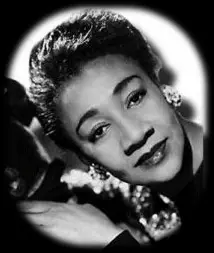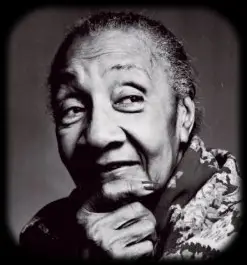ALBERTA HUNTER
 Alberta Hunter had a truly remarkable career. She started out singing in Chicago clubs at the age of 12; she was one of the original big selling Blues Divas who also wrote Bessie Smith‘s first hit; she had a four decade stage and cabaret career; she toured the world in WWII entertaining the Forces; she retired from performing to have a 20 year career as a nurse; she staged a comeback aged 81 and went on to record three more albums; she performed at the White House, and made a film biography, and this wonderful woman was still performing in a New York club at the tender age of 89!
Alberta Hunter had a truly remarkable career. She started out singing in Chicago clubs at the age of 12; she was one of the original big selling Blues Divas who also wrote Bessie Smith‘s first hit; she had a four decade stage and cabaret career; she toured the world in WWII entertaining the Forces; she retired from performing to have a 20 year career as a nurse; she staged a comeback aged 81 and went on to record three more albums; she performed at the White House, and made a film biography, and this wonderful woman was still performing in a New York club at the tender age of 89!
Born in Memphis in 1895, Alberta ran away to Chicago aged 12, where her impressive voice got her work singing in clubs and saloons. She gradually played better venues, eventually headlining the Dreamland Ballroom, but by 1921 the lure of New York was too strong to resist. Alberta was one of the first artists to join Harry Pace‘s ‘race label‘ Black Swan’ and her first record ‘How Long, Daddy, How Long?’ is credited with keeping the company from early bankruptcy. The following year she was poached by Paramount and put out ‘Daddy Blues’, ‘Don’t Pan Me’ and her own song ‘Downhearted Blues’. In 1923, Paramount issued 12 of Alberta’s records while over at Columbia ‘Downhearted Blues’ gave Bessie Smith her first hit. The following year Alberta moved to the Okeh label when she found that ‘Ink’ Williams had duped her for the royalties on Bessie’s records, so she also recorded for the Biltmore label under the name ‘Alberta Prime’ and for Gennett as ‘Josephine Beatty’. She also took Bessie’s place in the revue ‘How Come?’ which gave her a foothold on the Harlem cabaret scene.
Classic Blues Diva song, ‘Fine and Mellow’;
 Her stage work included playing in ‘Showboat’ opposite Paul Robeson in London’s West End in 1928/29, and shows in Paris, Russia and the Middle-East. Back in the USA, she played the Cotton Club and recorded ballads with Jack Jackson’s and Teddy Hill’s Orchestras on both sides of the Atlantic. When WWII came, her contribution to the War-effort was to tour India, Burma, China and Korea as well as Europe with the USO. After the war, she continued to star in cabaret until the death of her mother caused her to retire in 1956. She concealed her age (61) to train as a nurse. She followed this profession for twenty years, with a brief recording stint for Bluesville in 1961, until she was asked to retire in 1977.
Her stage work included playing in ‘Showboat’ opposite Paul Robeson in London’s West End in 1928/29, and shows in Paris, Russia and the Middle-East. Back in the USA, she played the Cotton Club and recorded ballads with Jack Jackson’s and Teddy Hill’s Orchestras on both sides of the Atlantic. When WWII came, her contribution to the War-effort was to tour India, Burma, China and Korea as well as Europe with the USO. After the war, she continued to star in cabaret until the death of her mother caused her to retire in 1956. She concealed her age (61) to train as a nurse. She followed this profession for twenty years, with a brief recording stint for Bluesville in 1961, until she was asked to retire in 1977.
